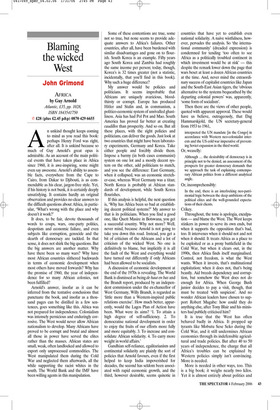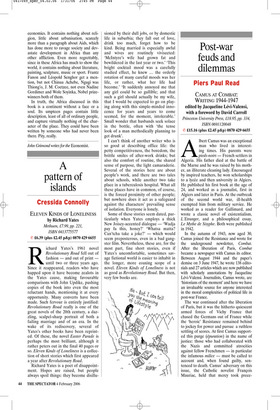Blaming the wicked West
John Grimond
AFRICA by Guy Arnold Atlantic, £35, pp. 1028, ISBN 1843541750 ✆ £28 (plus £2.45 p&p) 0870 429 6655 An unkind thought keeps coming to mind as you read this book: perhaps Henry Ford was right, after all. It is unkind because so much of Guy Arnold’s great opus is admirable. As an account of the main political events that have taken place in Africa since 1960, it is awe-inspiring, some might even say awesome. Arnold’s ability to assemble facts, everywhere from the Cape to Cairo, from Dakar to Djibouti, is as commendable as his clear, jargon-free style. Yet, if his history is not bunk, it is certainly deeply unsatisfying. It contains hardly an original observation and provides no clear answers to the difficult questions about Africa, in particular, ‘What’s wrong with the place and why doesn’t it work?’ It does, to be fair, devote thousands of words to coups, wars, one-party politics, despotism and economic failure, and even subjects like corruption, genocide and the dearth of democracy are tackled. In that sense, it does not shirk the big questions. But the big answers are another matter. Why have there been so many wars? Why have most African countries slithered backwards in terms of economic development when most others have moved forwards? Why has the promise of 1960, the year of independence for so many African colonies, not been fulfilled?
Arnold’s answer, insofar as it can be inferred from the tentative conclusions that punctuate the book, and insofar as a thousand pages can be distilled in a few sentences, goes something like this. Africa was not prepared for independence. Colonialism was intensely pernicious and enduringly corrosive. The West would never allow African nationalism to develop. Many Africans have proved to be corrupt and brutal and almost all those in power have served the elites rather than the masses. African states are small, weak, often landlocked and allowed to export only unprocessed commodities. The West manipulated them during the Cold War and neglected them afterwards, all the while supporting the racist whites in the south. The World Bank and the IMF have been willing agents in this manipulation. Some of these contentions are true, some not so true, but none seems to provide adequate answers to Africa’s failures. Other countries, after all, have been burdened with similar disadvantages and gone on to flourish. South Korea is an example. Fifty years ago South Korea and Zambia had roughly the same income per person; today, though, Korea’s is 32 times greater (not a statistic, incidentally, that you’ll find in this book). Why such a huge difference?
My answer would be policies and politicians. It seems improbable that Africans are uniquely avaricious, bloodthirsty or corrupt. Europe has produced Hitler and Stalin and, in communism, a politico-economic system of unrivalled ghastliness. Asia has had Pol Pot and Mao. South America has proved far better at creating caudillos than prosperity. And so on. But all these places, with the right policies and politicians, can deliver the goods. Just look at two countries that might have been laboratory experiments, Germany and Korea. Take either people and forcibly divide them. Impose a barmy (in both cases communist) system on one lot and a mostly decent system on the other, add politicians to match, and you see the difference: East Germany, when it collapsed, was an economic stretcher-case, whereas West Germany was a titan; North Korea is probably at African standards of development, while South Korea flourishes.
If this analysis is helpful, the next question is, ‘Why has Africa been so bad at establishing decent political systems?’ My answer to that is its politicians. When you find a good one, like Quett Masire in Botswana, you get a successful country. Why not more? Well, never mind, because Arnold is not going to take you down this road. Instead, you get a bit of criticism of the Africans and a lot of criticism of the wicked West. No one is definitively to blame, but implicitly it is all the fault of the West and everything would have turned out differently if only Africans had been allowed to be socialists.
A discussion of economic development at the end of the 1970s is revealing. The World Bank is dismissed as being de haut en bas and the Brandt report, produced by an independent commission under the ex-chancellor of West Germany, Willy Brandt, is regarded as ‘little more than a Western-inspired public relations exercise’. How much better, apparently, would the Lagos Plan of Action have been. What were its aims? ‘1. To attain a high degree of self-sufficiency. 2. To democratise national development in order to enjoy the fruits of our efforts more fully and more equitably. 3. To increase and consolidate African solidarity. 4. To carry more weight in world affairs.’ Gandhian self-reliance, egalitarianism and continental solidarity are plainly the sort of policies that Arnold favours, even if the first helped to keep India impoverished for decades, the second has seldom been associated with rapid economic growth, and the third, however desirable, seems quixotic in countries that have yet to establish even national solidarity. A naive wistfulness, however, pervades the analysis. So ‘the international community’ (dreaded expression) is condemned for tending ‘too often to see Africa as a politically troubled continent in which investment would be at risk’ — this despite the remark lower down the page that wars beset at least a dozen African countries at the time. And, never mind the extraordinary success of capitalist countries like Japan and the South-East Asian tigers, the ‘obvious alternative to the systems bequeathed by the departing colonial powers’ was, apparently, ‘some form of socialism’.
Then there are the views of other people, quoted with apparent approval. These would have us believe, outrageously, that Dag Hammarskjold, the UN secretary-general from 1953 to 1961,
interpreted the UN mandate [in the Congo] in accordance with Western neo-colonialist interests and the US cold war imperative of preventing Soviet expansion in the third world.
Or, weaselly:
Although ... the desirability of democracy is in principle not to be denied, an assessment of the prospects for greater democracy demands that we approach the task of explaining contemporary African politics from a different analytical angle.
Or, incomprehensibly:
In the end, there is an interlocking neo-patrimonial logic between the deep ambitions of the political elites and the well-grounded expectations of their clients.
Crikey.
Throughout, the tone is apologia, exculpation — and blame the West. The West keeps stinkers in power to serve its own ends, but when it supports the opposition that’s bad, too. It intervenes when it should not and not when it should. It treats Africa as a place to be exploited or as a proxy battlefield in the Cold War, but when it clears out, in the 1990s, then Africa finds itself marginalised. Control, not freedom, is what the West wants. When it invests, that’s multinational exploitation; when it does not, that’s being beastly. Aid breeds dependency and corruption, but somehow the West does not do enough for Africa. When George Bush junior decides to pay a visit, though, that must be treated ‘with suspicion’. And no wonder African leaders have chosen to support Robert Mugabe: how could they do anything else, after Tony Blair and his ministers had publicly criticised him?
It is true that the West has often behaved badly in Africa. It propped up tyrants like Mobutu Sese Seko during the Cold War, and it still undermines African economies through its indefensible agricultural and trade policies. But after 40 to 50 years of independence, the charge that all Africa’s troubles can be explained by Western policies simply isn’t convincing. More is needed.
More is needed in other ways, too. This is a big book; it weighs nearly two kilos. Yet it is almost entirely about politics and economics. It contains nothing about religion, little about urbanisation, scarcely more than a paragraph about Aids, which has done more to ravage society and devastate development in Africa than any other affliction. Even more regrettably, since in these Africa has much to show the world, it contains nothing about literature, painting, sculpture, music or sport. Frantz Fanon and Léopold Senghor get a mention, but not Chinua Achebe, Ngugi was Thiong’o, J. M. Coetzee, not even Nadine Gordimer and Wole Soyinka, Nobel prizewinners both of them.
In truth, the Africa discussed in this book is a continent without a face or a soul. Its umpteen pages contain little description, least of all of ordinary people, and capture virtually nothing of the character of the place. They could have been written by someone who had never been there. Pity, really.
John Grimond writes for the Economist.






























































































































 Previous page
Previous page